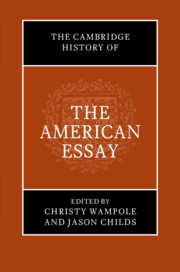Book contents
- The Cambridge History of the American Essay
- The Cambridge History of the American Essay
- Copyright page
- Contents
- Acknowledgments
- Notes on Contributors
- Introduction
- Part I The Emergence of the American Essay (1710–1865)
- Part II Voicing the American Experiment (1865–1945)
- Part III Postwar Essays and Essayism (1945–2000)
- Part IV Toward the Contemporary American Essay (2000–2020)
- 31 The American Essay Film: A Neglected Genre
- 32 Literary Theory, Criticism, and the Essay
- 33 Gender, Queerness, and the American Essay
- 34 Disability and the American Essay
- 35 The Radical Hybridity of the Lyric Essay
- 36 Writing Migration: Multiculturalism, Democracy, and the Essay Form
- 37 Latinx Culture and the Essay
- 38 Black Experience through the Essay
- 39 The Essay and the Anthropocene
- Recommendations for Further Reading
- Index
34 - Disability and the American Essay
from Part IV - Toward the Contemporary American Essay (2000–2020)
Published online by Cambridge University Press: 28 March 2024
- The Cambridge History of the American Essay
- The Cambridge History of the American Essay
- Copyright page
- Contents
- Acknowledgments
- Notes on Contributors
- Introduction
- Part I The Emergence of the American Essay (1710–1865)
- Part II Voicing the American Experiment (1865–1945)
- Part III Postwar Essays and Essayism (1945–2000)
- Part IV Toward the Contemporary American Essay (2000–2020)
- 31 The American Essay Film: A Neglected Genre
- 32 Literary Theory, Criticism, and the Essay
- 33 Gender, Queerness, and the American Essay
- 34 Disability and the American Essay
- 35 The Radical Hybridity of the Lyric Essay
- 36 Writing Migration: Multiculturalism, Democracy, and the Essay Form
- 37 Latinx Culture and the Essay
- 38 Black Experience through the Essay
- 39 The Essay and the Anthropocene
- Recommendations for Further Reading
- Index
Summary
Starting in the early twentieth century, this chapter surveys the most significant essays about disability and essays written by writers with disabilities, including Helen Keller, Randolph Bourne, Paul K. Longmore, Leonard Kriegel, and Esmé Weijun Wang. Exploring the common themes and the rich variety of styles represented in these essays, the chapter synthesizes a wide array of firsthand experiences by people with blindness, polio, schizophrenia, deformities, multiple sclerosis, and other conditions. Some of these essays highlight the discrimination and exclusion faced by the authors – Longmore’s stories of the financial hardships he faced due to his disability are a particularly compelling example – while others craft a new poetics to describe the singularity and promise of a life lived with a disability. The chapter closes with contemporary essays that illustrate the extent to which the field of disability writing has greatly diversified in the twenty-first century, offering a more extensive record of human experience.
Keywords
- Type
- Chapter
- Information
- The Cambridge History of the American Essay , pp. 582 - 596Publisher: Cambridge University PressPrint publication year: 2023

